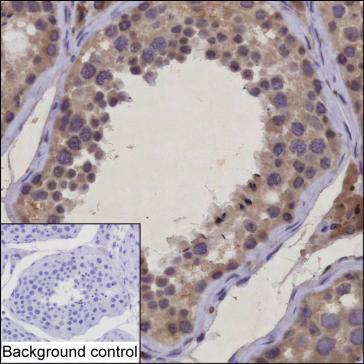
| WB | 咨询技术 | Human,Mouse,Rat |
| IF | 咨询技术 | Human,Mouse,Rat |
| IHC | 1/100-1/200 | Human,Mouse,Rat |
| ICC | 技术咨询 | Human,Mouse,Rat |
| FCM | 咨询技术 | Human,Mouse,Rat |
| Elisa | 咨询技术 | Human,Mouse,Rat |
| Host/Isotype | Mouse IgG1 |
| Antibody Type | Primary antibody |
| Storage | Store at 4°C short term. Aliquot and store at -20°C long term. Avoid freeze/thaw cycles. |
| Species Reactivity | Human |
| Immunogen | Purified recombinant fragment of human H2AP |
| Formulation | Purified antibody in PBS with 0.05% sodium azide |
+ +
以下是关于H2A磷酸化抗体(如γH2AX抗体)的参考文献示例,基于经典研究整理而成:
---
1. **文献名称**: *DNA double-stranded breaks induce histone H2AX phosphorylation on serine 139*
**作者**: Rogakou, E.P., Pilch, D.R., Orr, A.H., Ivanova, V.S., Bonner, W.M.
**摘要**: 该研究首次报道了H2A组蛋白变体H2AX在DNA双链断裂(DSBs)时发生丝氨酸139位点的磷酸化(γH2AX),并证实其作为DNA损伤标志物的作用,为后续基于γH2AX抗体的损伤检测技术奠定基础。
2. **文献名称**: *Megabase chromatin domains involved in DNA double-strand breaks in vivo*
**作者**: Sedelnikova, O.A., Rogakou, E.P., Panyutin, I.G., Bonner, W.M.
**摘要**: 通过免疫荧光结合γH2AX抗体,研究发现DSBs可诱导形成γH2AX焦点(foci),并揭示这些焦点与损伤修复蛋白的共定位,为DNA损伤响应机制提供了可视化工具。
3. **文献名称**: *γH2AX as a biomarker of DNA damage induced by radiation exposure*
**作者**: Rothkamm, K., Löbrich, M.
**摘要**: 本文系统评估了γH2AX抗体在电离辐射诱导DNA损伤检测中的应用,证明其灵敏度和定量分析的可靠性,并探讨了其在放射生物学和临床诊断中的潜力。
4. **文献名称**: *The role of histone H2A variants in epigenetic regulation of stem cell function*
**作者**: Grewal, S.I., Jia, S.
**摘要**: 该文献讨论了H2A组蛋白变体(包括H2AX)的翻译后修饰(如磷酸化)在干细胞表观遗传调控中的作用,强调了特异性抗体在解析染色质动态中的关键价值。
---
**说明**:
- 若用户实际指代的是其他H2A变体(如H2A.Z、H2A.Bbd),建议进一步明确目标修饰类型或功能背景。
- γH2AX抗体广泛应用于DNA损伤、癌症研究及毒理学,上述文献涵盖了其机制、技术应用及生物学意义。
The H2A antibody, specifically targeting histone H2A or its variants, plays a critical role in studying chromatin dynamics and DNA-related processes. Histone H2A is a core component of nucleosomes, essential for DNA packaging and gene regulation. Certain H2A variants, such as H2AX, are phosphorylated (e.g., γ-H2AX) in response to DNA double-strand breaks (DSBs), marking sites of damage and recruiting repair machinery. Antibodies against γ-H2AX are widely used as biomarkers for detecting DNA damage and monitoring genomic instability in cancer research, radiation biology, and toxicology.
H2A antibodies also aid in exploring epigenetic modifications, including ubiquitination (e.g., H2AK119ub in Polycomb-mediated gene silencing) and acetylation, which regulate transcription and chromatin remodeling. In developmental and stem cell studies, these antibodies help dissect mechanisms of differentiation and pluripotency. Techniques like ChIP-seq, immunofluorescence, and Western blotting leverage H2A-specific antibodies to map histone modifications, assess cell cycle-dependent changes, and study responses to therapies targeting chromatin.
Overall, H2A antibodies are indispensable tools for understanding DNA repair, epigenetic regulation, and cellular responses to stress, bridging molecular biology with translational applications in disease diagnosis and treatment.
×